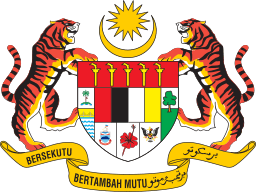Rukun Negara
The Rukun Negara or Rukunegara (Malay for 'National Principles') is the Malaysian declaration of national philosophy instituted by royal proclamation on Merdeka Day, 1970, in reaction to a serious race riot known as the 13 May Incident, which occurred in 1969. The incident proved at that time that Malaysian racial balance and stability was fragile. Immediately thereafter, the Malaysian government sought ways to foster unity among the various races in Malaysia. One of the methods used to encourage unity is the Rukunegara.
The word Rukun Negara can refer to the whole declaration, the words after the preamble (beginning Maka kami...) or the five principles alone.
The formulation of the principles of the Rukun Negara was the efforts of the National Consultative Council (Majlis Perundingan Negara or MAPEN), headed by Tun Abdul Razak. The aim of the Rukun Negara is to create harmony and unity among the various races in Malaysia (Jeong & Nor Fadzlina, 2012; 2007). Thereafter, the New Economic Policy (1971-1990) was launched in 1971, the aim was to create unity among the various races in Malaysia, through economic equality, via the reduction of the economic gap among the Malays and Bumiputera, with that of the Chinese and Indian communities in Malaysia.
The Rukun Negara bears similarity to the Pancasila national ideology/philosophy of neighbouring Indonesia.
Malay text
Bahawasanya Negara kita, Malaysia mendukung cita-cita hendak:
- mencapai perpaduan yang lebih erat di kalangan seluruh masyarakatnya;
- memelihara satu cara hidup demokratik;
- mencipta satu masyarakat adil di mana kemakmuran Negara akan dapat dinikmati bersama secara adil dan saksama;
- menjamin satu cara liberal terhadap tradisi-tradisi kebudayaannya yang kaya dan berbagai corak; dan
- membina satu masyarakat progresif yang akan menggunakan sains dan teknologi moden.
Maka kami, rakyat Malaysia, berikrar akan menumpukan seluruh tenaga dan usaha kami untuk mencapai cita-cita tersebut berdasarkan atas prinsip-prinsip yang berikut:
- KEPERCAYAAN KEPADA TUHAN;
- KESETIAAN KEPADA RAJA DAN NEGARA;
- KELUHURAN PERLEMBAGAAN;
- KEDAULATAN UNDANG-UNDANG;
- KESOPANAN DAN KESUSILAAN
English version
INDEED OUR COUNTRY, MALAYSIA aspires to achieving a greater unity for all her peoples:
- Achieving a more perfect unity amongst the whole of her society;
- Preserving a democratic way of life;
- Creating a just society where the prosperity of the country can be enjoyed together in a fair and equitable manner;
- Guaranteeing a liberal approach towards her rich and varied cultural traditions; and
- Building a progressive society that will make use of science and modern technology.
WE, THE PEOPLE OF MALAYSIA, pledge our united efforts to attain these ends guided by these principles:
- BELIEF IN GOD
- LOYALTY TO KING AND COUNTRY
- THE SUPREMACY OF THE CONSTITUTION
- THE RULE OF LAW
- COURTESY AND MORALITY
Source: PDF
Recitation
It is a norm for primary and secondary public schools in Malaysia to recite the pledge weekly during a compulsory assembly. Pledge reading follows immediately after the singing of the Malaysian national anthem, Negaraku. Of some interest, the Rukun Negara could usually be found behind the cover of every exercise book that is typically used by primary and secondary Malaysian public school students. This is primarily a move recognised to have been formulated to emulate the similar tactic introduced by the Singapore government immediately after its expulsion from the Malaysian federation in 1965.
On 8 December 2005, the Malaysian government has made reading of the pledge compulsory at official functions. The announcement was made a few months after the government made singing of the national anthem as compulsory at every official function.[1]
References
- Jeong Chun Hai @Ibrahim & Nor Fadzlina Nawi. (2012). Principles of Public Administration: Malaysian Perspectives. Kuala Lumpur: Pearson. ISBN 978-967-349-233-6
- Jeong Chun Hai @Ibrahim. (2007). Fundamental of Development Administration. Selangor: Scholar Press. ISBN 978-967-5-04508-0
